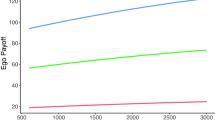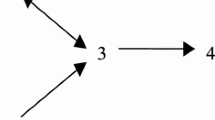Abstract
Empirical work suggests that social and economic networks are characterized by an unequal distribution of connections across individuals. This paper explores the circumstances under which networks will or will not exhibit inequality. Two specific models of network formation are explored. The first is a playing the field game in which the aggregate payoffs of an individual depend only on the number of his links and the aggregate number of links of the rest of the population. The second is a local spillovers game in which the aggregate payoffs of an individual depend on the distribution of links of all players and the identity of neighbors. For both class of games we develop results on existence and characterize equilibrium networks under different combinations of externalities/spillovers. We also examine conditions under which having more connections implies a higher payoff.
Similar content being viewed by others
References
Albert R, Jeong H, Barabasi A(2000) Error and attack tolerance of complex networks. Nature 46:378–381
Bala V, Goyal S (2000) A non-cooperative model of network formation. Econometrica 68(5): 1181–1231
Barabasi A-L (2001) Linked. Perseus, New York
Belleflamme P, Bloch F (2005) Market sharing agreements and collusive networks. Int Econ Rev, to appear
Bloch F (1997) Non-cooperative models of coalition formation with spillovers. In: Carraro C, Siniscalco D (eds) The economic theory of the environment. Cambridge University Press, Cambridge
Bloch F (1996), Sequential formation of coalitions in games with externalities and fixed payoff division. Games Econ Behav 14:90–123
Boorman S (1975) A combinatorial optimization model for transmission of job information through contact networks. Bell J Econ 6(1):216–249
Burt R (1992) Structural holes: the social structure of competition. Harvard University Press, Cambridge
Calvo A (2002) Job contact networks. J Econ Theory 115: 191–206
Dasgupta P, Stiglitz J (1980) Uncertainty industrial structure and the speed of R&D. Bell J Econ 11:1–28
Delapierre M, Mytelka L (1998) Blurring boundaries: new inter-firm relationships and the emergence of networked, knowledge-based oligopolies. In: Colombo MG (ed) The changing boundaries of the firm. Routledge, London
Diamond PA (1982) Aggregate demand management in search equilibrium. J Polit Econ 90:881–894
Durlauf S (2000) The memberships theory of poverty: the role of association in determining socio-economic outcomes, mimeo. University of Wisconsin, Madison
Dutta B, van den Nouweland A, Tijs S (1995) Link formation in cooperative situations. Int J Game Theory 27:245–256
Furusawa T, Konishi H (2002) Free trade networks, mimeo. Boston College
Goyal S (2005) Learning in networks: a survey paper. In: Demange G, Wooders M (eds) Group formation in economics: networks, clubs and coalitions. Cambridge University Press, Cambridge
Goyal S, Joshi S (2003) Networks of collaboration in oligopoly. Game Econ Behav 43:57–85
Goyal S, Joshi S (2005) Bilateralism and free-trade. Int Econ Rev, to appear
Goyal S, van der Leij M, Moraga JL (2006) Economics: an emerging small world. J Polit Econ, to appear.
Goyal S, Moraga JL (2001) R&D networks. Rand J Econ 32(4):686–707
Granovetter M (1985) Economic action and social structure: the problem of embeddedness. Am J Sociol 3:481–510
Hagedoorn J, Schakenraad J (1990) Alliances and partnerships in biotechnology and information technologies. MERIT University of Maastricht, Netherlands
Harary F (1972) Graph theory. Addison Wesley, Reading
Hendricks K, Piccione M, Tan G (1999) Equilibria in networks. Econometrica 67(6):1407–1434
Jackson M, Watts A (2002) The existence of pair-wise stable networks, mimeo. Caltech and University of Virginia
Jackson M, Wolinsky A (1996) A strategic model of economic and social networks. J Econ Theory 71(1):44–74
Kranton R, Minehart D (2001) A theory of buyer-seller networks. Am Econ Rev 91:485–508
Montgomery J (1991) Social networks and labor-market outcomes: toward an economic analysis. Am Econ Rev 81(5):1408–1418
Myerson R (1991) Game theory: analysis of conflict. Harvard University Press, Cambridge
Ray D, Vohra R (1997) Equilibrium binding agreements. J Econ Theory 73:30–78
Schelling T (1975) Micromotives and macrobehaviour. Norton, New York
Siedman D (2001) Preferential trading arrangements as strategic positioning, mimeo. University of Newcaste
Slikker M, van den Nouweland A (2001) Social and economic networks in cooperative game theory. Kluwer, Dordrecht
Wasserman S, Faust K (1994) Social network analysis: methods and applications. Cambridge University Press, Cambridge
Yi S (1997) Stable coalition structures with externalities. Games Econ Behav 20:201–237
Author information
Authors and Affiliations
Corresponding author
Rights and permissions
About this article
Cite this article
Goyal, S., Joshi, S. Unequal connections. Int J Game Theory 34, 319–349 (2006). https://doi.org/10.1007/s00182-006-0023-8
Received:
Accepted:
Published:
Issue Date:
DOI: https://doi.org/10.1007/s00182-006-0023-8




